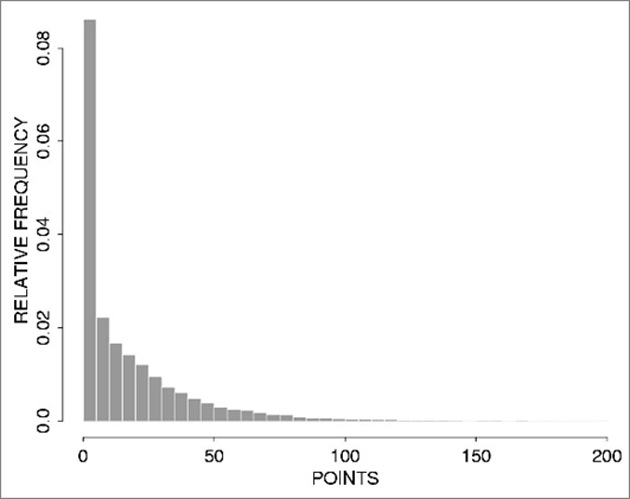| -- | April 26, 2018 Double Leaning Jowler  I just returned from a cabin in Wisconsin where I spent a couple of days with some of my old Lehman pals. Usually our reunions revolve around drinking, ripping on each other, playing cards, more drinking, and in this case, eating lots of bratwurst. When in Wisconsin, do as the Wisconsinites do. We also played Pass the Pigs, a game of risk and money management—very much like craps, except you’re not dealing with fair dice. In Pass the Pigs, you roll pig-shaped dice to score varying amounts of points. If the pigs both land on the same side, you score 1 point. If one lands on its back (razorback) or its feet (trotter), it is worth 5 points. If both land on their backs or their feet, it’s worth 20 points. Sometimes one lands on its nose (snouter), which is worth 10 points—40 if both of them do. And there is the exceptionally rare “leaning jowler,” where a pig lands balanced on its jowl and ear, which is worth 15 points. Pictured below is the extremely rare “double leaning jowler,” worth a whopping 60 points (this almost never happens).  Here is how the game works—you roll the pigs and score points until one of two things happen: you either pass the pigs, and bank your score until the next round, or you roll a side out.
A side out is where the pigs land on opposite sides, which resets your score to its starting point, and you lose your turn. First person to 100 points wins. I got curious about the math behind Pass the Pigs so I did some searching online. Wouldn’t you know, there have been several academic papers published on the math behind the game, which I appreciate, but also speaks to what passes for research these days. Anyway, people have roughly figured out the odds of each roll, simply through trial and error. In one study I saw, the professor got his students to conduct over 11,000 trials. The life of a grad student. Basically, you have a 21% chance of a side out on any given roll, so the chance of still holding the dice after ten rolls is low. A 20-roll possession would be an epic roll. I did see a 90-point roll last weekend, but it’s usually wise to pass the pigs after 20 points or so. Obviously, each throw of the pigs is an independent event, and getting “hot” in pig-rolling has no more significance than getting hot in coin-flipping or dice-throwing—although we tend to believe it does. Press Your Luck The conventional trading wisdom is that you’re supposed to add to winning trades and cut losing ones. There have been about five hundred books written on this topic, and there are a lot of widely-followed Twitter personalities whose advice basically amounts to… add to winning trades and cut losing ones. I suppose it is worth all the ink because people rarely do it. It’s a difficult skill to learn. When we make money, our instinct is to take profits immediately, and pass the pigs. As you can see from the chart below, the likelihood of getting to 100 points on one roll of the pigs is very, very small. 
Source: Pig Data and Bayesian Inference on Multinomial Probabilities by John C. Kern, Duquesne University If the probability of a “home run” trade by adding to winners over and over again is very small, why do people do it? Well, people do it in the belief that markets trend, and that pig rolls are serially correlated. If rolling a double razorback meant there was an increased chance of rolling another double razorback, then you would be reluctant to pass the pigs to the next player. But we all know that pig rolls are independent events, and market observations are not… right? We have more or less disproved the efficient market hypothesis—even as markets have become more efficient. Trend following is real. I have a mixed track record personally with trend following—I have worn out my welcome in a few trades over the years and it has cost me dearly. It is my personal theory that trend following happens in regimes, like volatility, and lots of other things. I talked about this here. There has been lots of discussion recently about whether the trend is up or down, but really, over the last couple of months, it has been trendless. I can think of only one trade I would consider supersizing over the next few years (I have mentioned it in The Daily Dirtnap). So if trend following is perhaps in hibernation, maybe this is a good time to be hitting singles and doubles instead of trying to uppercut the ball over the fence. I spend most of my time telling people they should have a very long time horizon, which is the only way to gain an advantage over the computers. But in the current environment, it is better to have a shorter time horizon. One measured in months, not years. Don’t misunderstand me—most people have no business trading tactically. Just think about taking profits (and cutting losses) a bit sooner, rather than later. As for the pigs, yes, I am easily amused. 
Jared Dillian
Editor, The 10th Man
 | Get Thought-Provoking Contrarian Insights from Jared Dillian
Meet Jared Dillian, former Wall Street trader, fearless contrarian, and maybe the most original investment analyst and writer today. His weekly newsletter, The 10th Man, will not just make you a better investor—it's also truly addictive. Get it free in your inbox every Thursday. |
Jared's premium investment service, Street Freak, is available now. Click here for our introductory offer. Jared Dillian, former head of ETF Trading at one of the biggest Wall Street firms and author of the highly acclaimed books, Street Freak: Money and Madness at Lehman Brothers , and All the Evil of This World , shows you how to pick and trade trends, and master your inner instincts. Learn how to use “Angry Analytics” as a leading indicator of budding trends you can profit from… and how to view any market situation through the lens of a trader. Jared’s keen insight into market psychology combined with an edgy, provocative voice make Street Freak an investment advisory like no other. Follow Jared on Twitter at @dailydirtnap. Share Your Thoughts on This Article
 http://www.mauldineconomics.com/members
Use of this content, the Mauldin Economics website, and related sites and applications is provided under the Mauldin Economics Terms & Conditions of Use. Unauthorized Disclosure Prohibited The information provided in this publication is private, privileged, and confidential information, licensed for your sole individual use as a subscriber. Mauldin Economics reserves all rights to the content of this publication and related materials. Forwarding, copying, disseminating, or distributing this report in whole or in part, including substantial quotation of any portion the publication or any release of specific investment recommendations, is strictly prohibited.
Participation in such activity is grounds for immediate termination of all subscriptions of registered subscribers deemed to be involved at Mauldin Economics’ sole discretion, may violate the copyright laws of the United States, and may subject the violator to legal prosecution. Mauldin Economics reserves the right to monitor the use of this publication without disclosure by any electronic means it deems necessary and may change those means without notice at any time. If you have received this publication and are not the intended subscriber, please contact service@mauldineconomics.com. Disclaimers The Mauldin Economics website, Yield Shark, Thoughts from the Frontline, Patrick Cox’s Tech Digest, Outside the Box, Over My Shoulder, World Money Analyst, Street Freak, ETF 20/20, Just One Trade, Transformational Technology Alert, Rational Bear, The 10th Man, Connecting the Dots, This Week in Geopolitics, Stray Reflections, and Conversations are published by Mauldin Economics, LLC. Information contained in such publications is obtained from sources believed to be reliable, but its accuracy cannot be guaranteed. The information contained in such publications is not intended to constitute individual investment advice and is not designed to meet your personal financial situation. The opinions expressed in such publications are those of the publisher and are subject to change without notice. The information in such publications may become outdated and there is no obligation to update any such information. You are advised to discuss with your financial advisers your investment options and whether any investment is suitable for your specific needs prior to making any investments.
John Mauldin, Mauldin Economics, LLC and other entities in which he has an interest, employees, officers, family, and associates may from time to time have positions in the securities or commodities covered in these publications or web site. Corporate policies are in effect that attempt to avoid potential conflicts of interest and resolve conflicts of interest that do arise in a timely fashion.
Mauldin Economics, LLC reserves the right to cancel any subscription at any time, and if it does so it will promptly refund to the subscriber the amount of the subscription payment previously received relating to the remaining subscription period. Cancellation of a subscription may result from any unauthorized use or reproduction or rebroadcast of any Mauldin Economics publication or website, any infringement or misappropriation of Mauldin Economics, LLC’s proprietary rights, or any other reason determined in the sole discretion of Mauldin Economics, LLC. Affiliate Notice Mauldin Economics has affiliate agreements in place that may include fee sharing. If you have a website or newsletter and would like to be considered for inclusion in the Mauldin Economics affiliate program, please go to http://affiliates.ggcpublishing.com/. Likewise, from time to time Mauldin Economics may engage in affiliate programs offered by other companies, though corporate policy firmly dictates that such agreements will have no influence on any product or service recommendations, nor alter the pricing that would otherwise be available in absence of such an agreement. As always, it is important that you do your own due diligence before transacting any business with any firm, for any product or service. © Copyright 2018 Mauldin Economics | -- |
